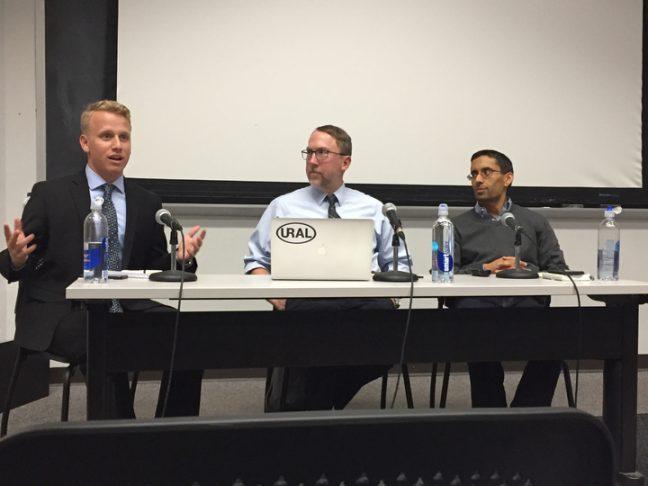The University of Wisconsin invited two experts on Syria to host a discussion Wednesday with students and faculty about the history of the Syrian crisis and its implications for the U.S.
Distinguished speakers Michael Singh and Andrew Kydd explored the current state of Syria and the U.S. administration’s role in the crisis. They answered questions from an eager audience, pulling from their vast expertise of Syrian history and current relations, as former senior director for Middle East affairs at the National Security Council and author of “Trust and Mistrust in International Relations,” respectively.
The lecture was hosted by the UW chapter of the Alexander Hamilton Society, a nonprofit, national organization emphasizing the importance of American leadership in the world.
Singh, the managing director and Lane-Swig senior fellow at the Washington Institute — the largest research institute devoted exclusively to the study of the Middle East — began by clarifying a misconception about the conflict in Syria.
“There really is no end in sight to the challenges we see in Syria,” Singh said. “If anything, they’re multiplying, and I think it will be quite difficult for some time.”
The Trump administration’s main goal in Syria is to defeat ISIS. But even the defeat of ISIS would mean almost nothing, as other radical jihadist groups are still prevalent, Singh said.
The U.S. is not engaged in any kind of hostilities toward the Syrian regime or pro-regime forces on the ground, Singh said. Occasionally there is conflict, but they are isolated incidents related to protecting our troops on the ground.
Before the war in Syria, Singh said, the country was somewhat unified. Today, it is very fragmented, and there is no hope for centralized authority in the near future.
The U.S. wants to prevent regional wars within Syria by setting boundaries with Iran, preventing the re-emergence of groups like ISIS and having Russia reimburse Syria for the financial damages it has created, Singh said.
Andrew Kydd, UW political science professor and game theorist, continued the discussion with his suggestions on how the U.S. should interact with Syria.
The U.S. cannot invade the country and take over, Kydd said, so the U.S. has to end war either by fostering negotiations or getting parties in Syria to stop killing so many civilians.
Kydd said this is possible by aiding the rebel forces against the regime or taxing atrocities the regime commits against civilians.
“With millions displaced and roughly 400,000 people dead, the crisis in Syria is an unparalleled humanitarian catastrophe,” Kydd said.
Singh said to attempt peace in Syria, good local governance must be in place and maintained so that external forces do not take over again.
He expressed concern that this war might repeat itself if actions are not executed precisely and sensitively.
“There are no easy options for the U.S. at this time,” Singh said.


